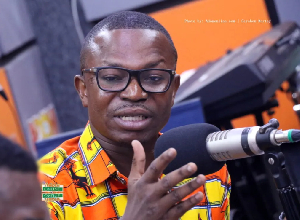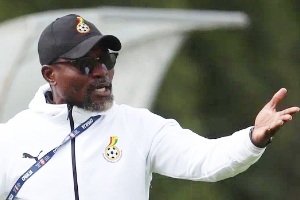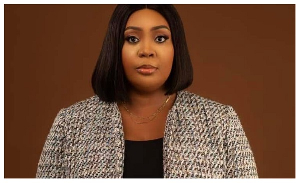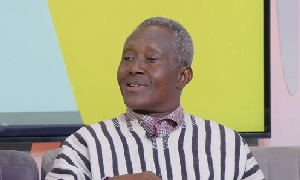On September 29, 1962, Komla Agbeli Gbedemah, aka Afro Gbede, one-time confidante of President Kwame Nkrumah, Founding Member of the Convention People’s Party (CPP) and Minister of Finance for seven years in the CPP Government wrote an open letter to Nkrumah from his exile in Togo expressing concern about the Seven-Year Development plan –Work and Happiness for All – and shared his views on the state of Ghana at the time.
In this letter titled “It will not be work and happiness for all”, Gbedemah pointed out to the President that, the plan was grandiose and over-ambitious and wondered where the money would be found to finance this plan stating: “The effect your new 7-year “development” ideas will have on Ghana’s economic weal, and particularly, the chances of Ghana finding the huge sums of money, running into several hundreds of millions, assuming even that these is no shortage of “capitalists” willing to lend you money.” He continued by stating “in my view, this Development Plan will not bring Work and Happiness to all. It will result in more unemployment and unhappiness for many.”
He stated in this letter his bewilderment at how the President hoped the 7-year plan will be financed: “However, with this new proposal for a 7-year plan, on the scale envisaged, I have fears, grave fears indeed. But I may be fearing when there is nothing to fear. You may have found in the one year that I left your Ministry of Finance, new methods of producing revenue that I was unable in all my 7 years at the post, to discover. Perhaps that was why you decided not to even consult me before announcing in Parliament on the 18th of April last year that the Budget Bureau would come under your direct control immediately. You have most probably found how cash can be produced to pay for everything on an increasing and grand scale. If this is so Mr. President, I must confess my failure as your Finance Minister for 7 years and I must bow to your superior knowledge of what I spent 7 years trying to learn but failed to know.”
Gbedemah had been asked by Nkrumah to resign in September 1961, under the pretext that it was “undesirable that men with varied business connections should be members of my Government with must from now on be increasingly animated by socialist ideas.” Gbedemah’s business connections were a poultry farm in Adidome and a joint venture for real estate development which revolved around 5 two-bedroom houses. Gbedemah signs off his resignation letter thus: “Today we come to the parting of the ways. I would like you to know that I depart with no ill-will toward you personally, and that it was you who drove me out of your Government, because ostensibly, you have now found more able and more trustworthy lieutenants than myself and our Comrade Kojo Botsio, the three persons who thought out and built up the Convention People’s Party.”
A year after Gbedemah’s resignation, Nkrumah sent a diplomat to Lome to convince Gbedemah to come back to work for the CPP government. Gbedemah, was adamant he was not interested in being made a Cabinet Minister: “I will not come back to accept an apology of an appointment…I am not so wedded to public office that I must suffer the humiliation of coming in such company again, if even it is to serve my country…. I will not return until either the crimes alleged against me have been proved (I am ready to present myself if a fair trial is assured), or if they cannot be proved, a suitable apology is rendered to me. Freedom to speak and write what ones feels is true and right, is too precious to be exchanged for a mess of unsavoury potage.
In this letter, Gbedemah spared no punches and was blunt with his criticism of what Ghana had become under Nkrumah: “Anyone who was present at the State House in Accra on that morning when the First Republic was inaugurated and heard you take your oath as President “to preserve and defend the Constitution and to do right to all manner of people according to law without fear or favour, affection or ill will” must have had great hopes for the new republic. In barely two years of Republican rule, if these persons have kept in touch with Ghana affairs, how sad and disillusioned they must be to contemplate what has happened, watching the gradual degeneration of the basic democracy we then had, into a totalitarian regime and a Police State.”
With regard to how some of Nkrumah’s opponents as well as his one-time friends and supporters had been arrested and sent to jail without trial, Gbedemah asserted: “I do not have any status now to advise you as I used to do until I fell out of your favour, but I will venture even now, because I am a Ghanaian, to offer you this bit of advice: the civilized world which you denounce as “ideologically bankrupt and …….”, would be glad to see you showing the way and the example, by releasing all your people whom you thrown into jail without trial, really tempering Justice with Mercy, if justice was ever done under the Preventive Detention Act 1958. Let our sister African Sovereign States whom you aspire to lead, and the rest of the civilized world see that with the dawn of the era of Nkrumaism in Ghana, you saw the need to end the growing tendency to rule by jungle law.”
And Gbedemah did not spare Nkrumah personally in his criticisms either “Can it be the measure of your fairness to your people as their simple and modest head of state, the Model of Rectitude and Fount of Honour, that you allow more than £325,000 (three hundred and twenty five thousand pounds sterling) of the poor people’s money to be used to build yourself a private palace which, to avoid criticism, you then manoeuvre to make one of the official residences of the head of state, whereas the same poor people have already provided 3 other Palatial Residences and other accoutrements of office, that could make any monarch blush or the Head of a real Socialist State thoroughly ashamed of himself to live in such luxury at the expense of toiling masses?
Gbedemah went on to be very explicit with his disapproval of what had become a personality cult and the hero worshipping of President Nkrumah and continued: “It must be mark of your Presidential prerogative, conferred by the oath you took on Republic Day in 1960, that universities, colleges, schools, avenues and roads, parks, public house, youth centres and hostels, exhibition halls, factories and aeroplanes – almost everything that deserves to be named in Ghana – must be named after you and you alone, as the one man who planned and executed the revolution, in prison as well as out of it, to bring Ghana her Independence, and in “gratitude” for which you must be loaded with all sorts of appellations, sacrilegious as well as not – Osagyefo, Fount of Honour of the Nation, Messiah, Teacher, Redeemer, Leader, Ideological Mentor, the Infallible, who approval must be obtained for everything to be done in Ghana. Truly President Kwame Nkrumah, you have succeed uniquely in making Ghana a land without glory for all but your high Dedication! Ghana Honours where instituted at Independence in 1957. Could you tell the world, or your own people how many of the thousands in all spheres of public service, either in politics, the civil service or even in private life have been honoured by you in the five years since we became a nation, Mr. President, Fount of Honour?
He then pleads with Nkrumah to reconsider launching the 7-year plan as he feels it would harm the country and its people more than it will benefit them: “Please alter your plans for Ghana’s sake and save her from precipitate collapse. The new development plan will not bring “work and happiness” to all, but unemployment and suffering to many. I implore you not to rush our dear country into disaster but to go step by step towards the land of abundance and satisfaction that you have promised the people and which will come if you don’t rush so madly into chaos and confusion.”
He also expresses the hope Ghana would definitely see better days : “Let me assure you Kwame, that Ghana will not suffer too long under the iron dictatorship you set out to build in 1949 under the guise and clarion call of “self-government now” and “democracy”. The end is approaching of your intrigues and deception of the people.
Gbedemah’s 29-page letter ends with him saying: “If I should live on, I shall consider it my further duty to strive in any way God shall give me the light to see, in company of any countrymen of ours who shall see in the same way as I do; together to strive till the real democracy we earlier promised our people is established; and not an illusory and will-o-the wisp sort of people’s freedom, where in men are huddled in fear into droves of workers whose happiness and plenty for all are constantly promised but never achieved and who get poorer and unhappier with failure after failure of ill-conceived and megalomaniacal project after project.
Gbedemah ends the letter signing off thus:
Opinions of Friday, 26 February 2016
Columnist: Danquah Institute


















